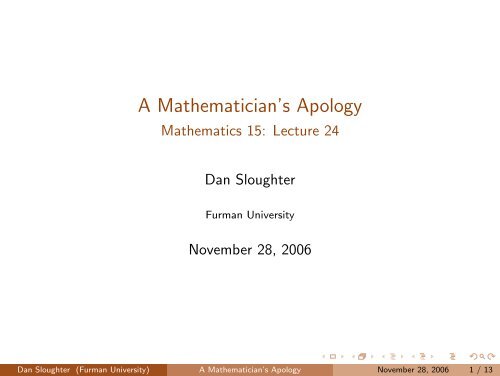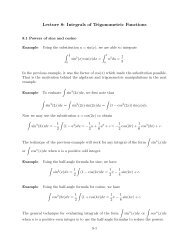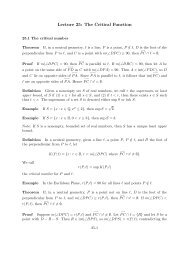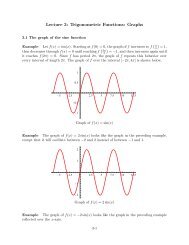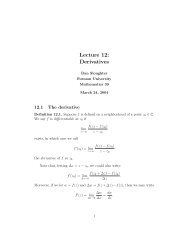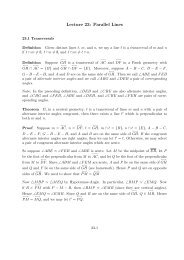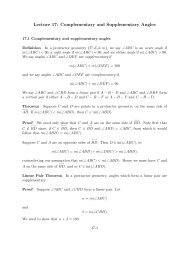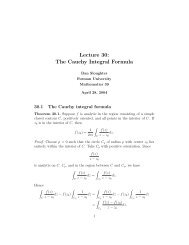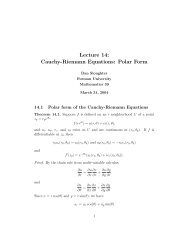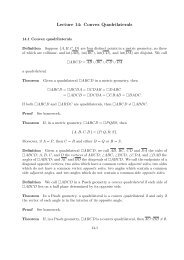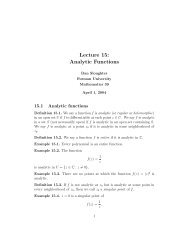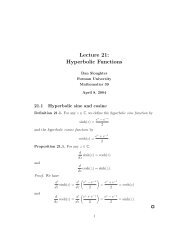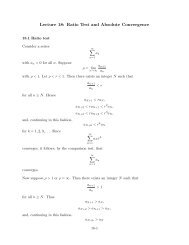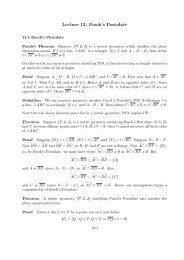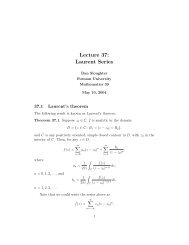A Mathematician’s Apology
A Mathematician's Apology - Mathematics 15 ... - Furman University
A Mathematician's Apology - Mathematics 15 ... - Furman University
Create successful ePaper yourself
Turn your PDF publications into a flip-book with our unique Google optimized e-Paper software.
A <strong>Mathematician’s</strong> <strong>Apology</strong><br />
Mathematics 15: Lecture 24<br />
Dan Sloughter<br />
Furman University<br />
November 28, 2006<br />
Dan Sloughter (Furman University) A <strong>Mathematician’s</strong> <strong>Apology</strong> November 28, 2006 1 / 13
G. H. Hardy<br />
◮ 1877 - 1947<br />
Dan Sloughter (Furman University) A <strong>Mathematician’s</strong> <strong>Apology</strong> November 28, 2006 2 / 13
G. H. Hardy<br />
◮ 1877 - 1947<br />
◮ One of the most renowned English mathematicians since Newton.<br />
Dan Sloughter (Furman University) A <strong>Mathematician’s</strong> <strong>Apology</strong> November 28, 2006 2 / 13
G. H. Hardy<br />
◮ 1877 - 1947<br />
◮ One of the most renowned English mathematicians since Newton.<br />
◮ More than that, after English mathematics had languished for more<br />
than a 100 years, he led a revival in the first decades of the 20th<br />
century which brought English mathematics, particularly in the area<br />
of analysis, back into the mainstream of European mathematics.<br />
Dan Sloughter (Furman University) A <strong>Mathematician’s</strong> <strong>Apology</strong> November 28, 2006 2 / 13
G. H. Hardy<br />
◮ 1877 - 1947<br />
◮ One of the most renowned English mathematicians since Newton.<br />
◮ More than that, after English mathematics had languished for more<br />
than a 100 years, he led a revival in the first decades of the 20th<br />
century which brought English mathematics, particularly in the area<br />
of analysis, back into the mainstream of European mathematics.<br />
◮ For most of his life, Hardy led the life of a slightly eccentric<br />
Cambridge/Oxford don. His main love outside of mathematics was<br />
cricket (he once told C. P. Snow, “If I knew that I was going to die<br />
today, I think I should still want to hear the cricket scores.”)<br />
Dan Sloughter (Furman University) A <strong>Mathematician’s</strong> <strong>Apology</strong> November 28, 2006 2 / 13
Srinivasa Ramanujan<br />
◮ 1887 -1920<br />
Dan Sloughter (Furman University) A <strong>Mathematician’s</strong> <strong>Apology</strong> November 28, 2006 3 / 13
Srinivasa Ramanujan<br />
◮ 1887 -1920<br />
◮ Hardy’s collaboration with Ramanujan is the one unusual episode of<br />
his life.<br />
Dan Sloughter (Furman University) A <strong>Mathematician’s</strong> <strong>Apology</strong> November 28, 2006 3 / 13
Srinivasa Ramanujan<br />
◮ 1887 -1920<br />
◮ Hardy’s collaboration with Ramanujan is the one unusual episode of<br />
his life.<br />
◮ Ramanujan was an Indian clerk, relatively unschooled in mathematics.<br />
Dan Sloughter (Furman University) A <strong>Mathematician’s</strong> <strong>Apology</strong> November 28, 2006 3 / 13
Srinivasa Ramanujan<br />
◮ 1887 -1920<br />
◮ Hardy’s collaboration with Ramanujan is the one unusual episode of<br />
his life.<br />
◮ Ramanujan was an Indian clerk, relatively unschooled in mathematics.<br />
◮ Although lacking in formal education, he had discovered numerous<br />
mathematical theorems, some of which he put in a letter which he<br />
sent to several English mathematicians, Hardy included, in 1913.<br />
Dan Sloughter (Furman University) A <strong>Mathematician’s</strong> <strong>Apology</strong> November 28, 2006 3 / 13
Srinivasa Ramanujan<br />
◮ 1887 -1920<br />
◮ Hardy’s collaboration with Ramanujan is the one unusual episode of<br />
his life.<br />
◮ Ramanujan was an Indian clerk, relatively unschooled in mathematics.<br />
◮ Although lacking in formal education, he had discovered numerous<br />
mathematical theorems, some of which he put in a letter which he<br />
sent to several English mathematicians, Hardy included, in 1913.<br />
◮ Hardy was the only one to recognize the genius behind the letters and<br />
subsequently arranged for Ramanujan to come to England in 1914.<br />
Dan Sloughter (Furman University) A <strong>Mathematician’s</strong> <strong>Apology</strong> November 28, 2006 3 / 13
Hardy and Ramanujan<br />
◮ Hardy has written that Ramanujan<br />
Dan Sloughter (Furman University) A <strong>Mathematician’s</strong> <strong>Apology</strong> November 28, 2006 4 / 13
Hardy and Ramanujan<br />
◮ Hardy has written that Ramanujan<br />
was then nearly twenty-five. The years between eighteen<br />
and twenty-five are the critical years in a mathematician’s<br />
career, and the damage had been done. Ramanujan’s genius<br />
never had again its chance of full development. (Ramanujan<br />
by G. H. Hardy, Cambridge, 1940, page 6)<br />
Dan Sloughter (Furman University) A <strong>Mathematician’s</strong> <strong>Apology</strong> November 28, 2006 4 / 13
Hardy and Ramanujan<br />
◮ Hardy has written that Ramanujan<br />
was then nearly twenty-five. The years between eighteen<br />
and twenty-five are the critical years in a mathematician’s<br />
career, and the damage had been done. Ramanujan’s genius<br />
never had again its chance of full development. (Ramanujan<br />
by G. H. Hardy, Cambridge, 1940, page 6)<br />
◮ Concerning the results in the initial letter from Ramanujan, Hardy said:<br />
Dan Sloughter (Furman University) A <strong>Mathematician’s</strong> <strong>Apology</strong> November 28, 2006 4 / 13
Hardy and Ramanujan<br />
◮ Hardy has written that Ramanujan<br />
was then nearly twenty-five. The years between eighteen<br />
and twenty-five are the critical years in a mathematician’s<br />
career, and the damage had been done. Ramanujan’s genius<br />
never had again its chance of full development. (Ramanujan<br />
by G. H. Hardy, Cambridge, 1940, page 6)<br />
◮ Concerning the results in the initial letter from Ramanujan, Hardy said:<br />
A single look at them is enough to show that they could<br />
only be written down by a mathematician of the highest<br />
class. They must be true because, if they were not true, no<br />
one would have had the imagination to invent them.<br />
(Ramanujan by G. H. Hardy, Cambridge, 1940, page 9)<br />
Dan Sloughter (Furman University) A <strong>Mathematician’s</strong> <strong>Apology</strong> November 28, 2006 4 / 13
Patterns<br />
◮ Hardy (page 2027): “A mathematician, like a painter or a poet, is a<br />
maker of patterns. If his patterns are more permanent than theirs, it<br />
is because they are made with ideas.”<br />
Dan Sloughter (Furman University) A <strong>Mathematician’s</strong> <strong>Apology</strong> November 28, 2006 5 / 13
Patterns<br />
◮ Hardy (page 2027): “A mathematician, like a painter or a poet, is a<br />
maker of patterns. If his patterns are more permanent than theirs, it<br />
is because they are made with ideas.”<br />
◮ What does Hardy mean when he says there is “no permanent place<br />
for ugly mathematics?”<br />
Dan Sloughter (Furman University) A <strong>Mathematician’s</strong> <strong>Apology</strong> November 28, 2006 5 / 13
Aesthetic appeal<br />
◮ Hardy claims (page 2027) that “it would be difficult to find an<br />
educated man quite insensitive to the aesthetic appeal of<br />
mathematics.”<br />
Dan Sloughter (Furman University) A <strong>Mathematician’s</strong> <strong>Apology</strong> November 28, 2006 6 / 13
Aesthetic appeal<br />
◮ Hardy claims (page 2027) that “it would be difficult to find an<br />
educated man quite insensitive to the aesthetic appeal of<br />
mathematics.”<br />
◮ One piece of evidence: many people derive enjoyment from solving an<br />
intellectually challenging game, such as chess or the puzzles often<br />
found in newspapers.<br />
Dan Sloughter (Furman University) A <strong>Mathematician’s</strong> <strong>Apology</strong> November 28, 2006 6 / 13
Aesthetic appeal<br />
◮ Hardy claims (page 2027) that “it would be difficult to find an<br />
educated man quite insensitive to the aesthetic appeal of<br />
mathematics.”<br />
◮ One piece of evidence: many people derive enjoyment from solving an<br />
intellectually challenging game, such as chess or the puzzles often<br />
found in newspapers.<br />
◮ Does his argument work?<br />
Dan Sloughter (Furman University) A <strong>Mathematician’s</strong> <strong>Apology</strong> November 28, 2006 6 / 13
Trivial mathematics<br />
◮ Hardy claims (page 2029) that a chess problem is mathematics, but<br />
trivial mathematics. In what sense is chess “trivial” mathematics?<br />
Dan Sloughter (Furman University) A <strong>Mathematician’s</strong> <strong>Apology</strong> November 28, 2006 7 / 13
Trivial mathematics<br />
◮ Hardy claims (page 2029) that a chess problem is mathematics, but<br />
trivial mathematics. In what sense is chess “trivial” mathematics?<br />
◮ He goes on to say that the beauty of a theorem is enhanced by its<br />
seriousness.<br />
Dan Sloughter (Furman University) A <strong>Mathematician’s</strong> <strong>Apology</strong> November 28, 2006 7 / 13
Trivial mathematics<br />
◮ Hardy claims (page 2029) that a chess problem is mathematics, but<br />
trivial mathematics. In what sense is chess “trivial” mathematics?<br />
◮ He goes on to say that the beauty of a theorem is enhanced by its<br />
seriousness.<br />
◮ Note: he considers a mathematical theorem “serious,” not for<br />
practical reasons, but for the significance of the ideas which it<br />
connects.<br />
Dan Sloughter (Furman University) A <strong>Mathematician’s</strong> <strong>Apology</strong> November 28, 2006 7 / 13
Trivial mathematics<br />
◮ Hardy claims (page 2029) that a chess problem is mathematics, but<br />
trivial mathematics. In what sense is chess “trivial” mathematics?<br />
◮ He goes on to say that the beauty of a theorem is enhanced by its<br />
seriousness.<br />
◮ Note: he considers a mathematical theorem “serious,” not for<br />
practical reasons, but for the significance of the ideas which it<br />
connects.<br />
◮ How does the beauty of a theorem compare with the beauty of a<br />
poem?<br />
Dan Sloughter (Furman University) A <strong>Mathematician’s</strong> <strong>Apology</strong> November 28, 2006 7 / 13
Two examples<br />
◮ Hardy wishes now to illustrate what he has been describing by<br />
considering two mathematical theorems. What restrictions in choice<br />
is he working under?<br />
Dan Sloughter (Furman University) A <strong>Mathematician’s</strong> <strong>Apology</strong> November 28, 2006 8 / 13
Two examples<br />
◮ Hardy wishes now to illustrate what he has been describing by<br />
considering two mathematical theorems. What restrictions in choice<br />
is he working under?<br />
◮ He chooses two, which he claims are simple but of the highest class:<br />
Dan Sloughter (Furman University) A <strong>Mathematician’s</strong> <strong>Apology</strong> November 28, 2006 8 / 13
Two examples<br />
◮ Hardy wishes now to illustrate what he has been describing by<br />
considering two mathematical theorems. What restrictions in choice<br />
is he working under?<br />
◮ He chooses two, which he claims are simple but of the highest class:<br />
◮ Euclid’s proof that there are an infinite number of primes, and<br />
Dan Sloughter (Furman University) A <strong>Mathematician’s</strong> <strong>Apology</strong> November 28, 2006 8 / 13
Two examples<br />
◮ Hardy wishes now to illustrate what he has been describing by<br />
considering two mathematical theorems. What restrictions in choice<br />
is he working under?<br />
◮ He chooses two, which he claims are simple but of the highest class:<br />
◮ Euclid’s proof that there are an infinite number of primes, and<br />
◮ the Pythagoreans’ proof that √ 2 is irrational.<br />
Dan Sloughter (Furman University) A <strong>Mathematician’s</strong> <strong>Apology</strong> November 28, 2006 8 / 13
Two examples<br />
◮ Hardy wishes now to illustrate what he has been describing by<br />
considering two mathematical theorems. What restrictions in choice<br />
is he working under?<br />
◮ He chooses two, which he claims are simple but of the highest class:<br />
◮ Euclid’s proof that there are an infinite number of primes, and<br />
◮ the Pythagoreans’ proof that √ 2 is irrational.<br />
◮ Reductio ad absurdum (argument by contradiction) (page 2031): “A<br />
far finer gambit than any chess gambit: a chess player may offer the<br />
sacrifice of a pawn or even a piece, but a mathematician offers the<br />
game.”<br />
Dan Sloughter (Furman University) A <strong>Mathematician’s</strong> <strong>Apology</strong> November 28, 2006 8 / 13
Theorem and proof<br />
◮ Note: Hardy intertwines understanding the statement and<br />
understanding the proof of the theorem: they are inseparable.<br />
Dan Sloughter (Furman University) A <strong>Mathematician’s</strong> <strong>Apology</strong> November 28, 2006 9 / 13
Theorem and proof<br />
◮ Note: Hardy intertwines understanding the statement and<br />
understanding the proof of the theorem: they are inseparable.<br />
◮ These are serious mathematical theorems:<br />
Dan Sloughter (Furman University) A <strong>Mathematician’s</strong> <strong>Apology</strong> November 28, 2006 9 / 13
Theorem and proof<br />
◮ Note: Hardy intertwines understanding the statement and<br />
understanding the proof of the theorem: they are inseparable.<br />
◮ These are serious mathematical theorems:<br />
◮ primes are vital for all of arithmetic, and<br />
Dan Sloughter (Furman University) A <strong>Mathematician’s</strong> <strong>Apology</strong> November 28, 2006 9 / 13
Theorem and proof<br />
◮ Note: Hardy intertwines understanding the statement and<br />
understanding the proof of the theorem: they are inseparable.<br />
◮ These are serious mathematical theorems:<br />
◮ primes are vital for all of arithmetic, and<br />
◮ the Pythagorean result easily extends to other results, led to the<br />
realization that rational arithmetic wasn’t enough, and prompted the<br />
development of the theory of proportions and irrational numbers.<br />
Dan Sloughter (Furman University) A <strong>Mathematician’s</strong> <strong>Apology</strong> November 28, 2006 9 / 13
Theorem and proof<br />
◮ Note: Hardy intertwines understanding the statement and<br />
understanding the proof of the theorem: they are inseparable.<br />
◮ These are serious mathematical theorems:<br />
◮ primes are vital for all of arithmetic, and<br />
◮ the Pythagorean result easily extends to other results, led to the<br />
realization that rational arithmetic wasn’t enough, and prompted the<br />
development of the theory of proportions and irrational numbers.<br />
◮ But are these theorems practical? Does an engineer need that many<br />
primes or that many decimal places?<br />
Dan Sloughter (Furman University) A <strong>Mathematician’s</strong> <strong>Apology</strong> November 28, 2006 9 / 13
Usefulness of mathematics<br />
◮ In another part of the <strong>Apology</strong>, Hardy argues that “[t]he ‘real’<br />
mathematics of the ‘real’ mathematicians, the mathematics of Fermat<br />
and Euler and Gauss and Abel and Riemann, is almost wholly<br />
‘useless’ (and this is as true of ‘applied’ as of ‘pure’ mathematics).”<br />
Dan Sloughter (Furman University) A <strong>Mathematician’s</strong> <strong>Apology</strong> November 28, 2006 10 / 13
Usefulness of mathematics<br />
◮ In another part of the <strong>Apology</strong>, Hardy argues that “[t]he ‘real’<br />
mathematics of the ‘real’ mathematicians, the mathematics of Fermat<br />
and Euler and Gauss and Abel and Riemann, is almost wholly<br />
‘useless’ (and this is as true of ‘applied’ as of ‘pure’ mathematics).”<br />
◮ And he says (page 2026): “I have never done anything ‘useful.’ No<br />
discovery of mine has made, or is likely to make, directly or indirectly,<br />
for good or ill, the least difference to the amenity of the world.”<br />
Dan Sloughter (Furman University) A <strong>Mathematician’s</strong> <strong>Apology</strong> November 28, 2006 10 / 13
Usefulness of mathematics<br />
◮ In another part of the <strong>Apology</strong>, Hardy argues that “[t]he ‘real’<br />
mathematics of the ‘real’ mathematicians, the mathematics of Fermat<br />
and Euler and Gauss and Abel and Riemann, is almost wholly<br />
‘useless’ (and this is as true of ‘applied’ as of ‘pure’ mathematics).”<br />
◮ And he says (page 2026): “I have never done anything ‘useful.’ No<br />
discovery of mine has made, or is likely to make, directly or indirectly,<br />
for good or ill, the least difference to the amenity of the world.”<br />
◮ Having lived through both world wars, he was particularly concerned<br />
about the uses of mathematics in time of war.<br />
Dan Sloughter (Furman University) A <strong>Mathematician’s</strong> <strong>Apology</strong> November 28, 2006 10 / 13
Usefulness of mathematics<br />
◮ In another part of the <strong>Apology</strong>, Hardy argues that “[t]he ‘real’<br />
mathematics of the ‘real’ mathematicians, the mathematics of Fermat<br />
and Euler and Gauss and Abel and Riemann, is almost wholly<br />
‘useless’ (and this is as true of ‘applied’ as of ‘pure’ mathematics).”<br />
◮ And he says (page 2026): “I have never done anything ‘useful.’ No<br />
discovery of mine has made, or is likely to make, directly or indirectly,<br />
for good or ill, the least difference to the amenity of the world.”<br />
◮ Having lived through both world wars, he was particularly concerned<br />
about the uses of mathematics in time of war.<br />
◮ He thought his work in number theory could never have any practical<br />
use, but this has changed with the creation of modern cryptographic<br />
systems.<br />
Dan Sloughter (Furman University) A <strong>Mathematician’s</strong> <strong>Apology</strong> November 28, 2006 10 / 13
Usefulness of mathematics<br />
◮ In another part of the <strong>Apology</strong>, Hardy argues that “[t]he ‘real’<br />
mathematics of the ‘real’ mathematicians, the mathematics of Fermat<br />
and Euler and Gauss and Abel and Riemann, is almost wholly<br />
‘useless’ (and this is as true of ‘applied’ as of ‘pure’ mathematics).”<br />
◮ And he says (page 2026): “I have never done anything ‘useful.’ No<br />
discovery of mine has made, or is likely to make, directly or indirectly,<br />
for good or ill, the least difference to the amenity of the world.”<br />
◮ Having lived through both world wars, he was particularly concerned<br />
about the uses of mathematics in time of war.<br />
◮ He thought his work in number theory could never have any practical<br />
use, but this has changed with the creation of modern cryptographic<br />
systems.<br />
◮ Another exception: he is known in biology for the Hardy-Weinberg<br />
Law for genetic equilibrium.<br />
Dan Sloughter (Furman University) A <strong>Mathematician’s</strong> <strong>Apology</strong> November 28, 2006 10 / 13
Mathematical realism<br />
◮ Elsewhere in his <strong>Apology</strong>, Hardy explains his position on<br />
mathematical realism:<br />
Dan Sloughter (Furman University) A <strong>Mathematician’s</strong> <strong>Apology</strong> November 28, 2006 11 / 13
Mathematical realism<br />
◮ Elsewhere in his <strong>Apology</strong>, Hardy explains his position on<br />
mathematical realism:<br />
I believe that mathematical reality lies outside us, that our<br />
function is to discover or observe it, and that the theorems<br />
which we prove, and which we describe grandiloquently as<br />
our ‘creations’, are simply our notes of our observations.<br />
Dan Sloughter (Furman University) A <strong>Mathematician’s</strong> <strong>Apology</strong> November 28, 2006 11 / 13
Mathematical realism<br />
◮ Elsewhere in his <strong>Apology</strong>, Hardy explains his position on<br />
mathematical realism:<br />
I believe that mathematical reality lies outside us, that our<br />
function is to discover or observe it, and that the theorems<br />
which we prove, and which we describe grandiloquently as<br />
our ‘creations’, are simply our notes of our observations.<br />
◮ Geometry is not about the physical world: “earthquakes and eclipses<br />
are not mathematical concepts.” (page 2035)<br />
Dan Sloughter (Furman University) A <strong>Mathematician’s</strong> <strong>Apology</strong> November 28, 2006 11 / 13
Mathematical realism (cont’d)<br />
◮ Mathematicians offer a supply of models with which to approximate<br />
the physical world: pure mathematics is independent of any “detail of<br />
the physical world,” (page 2035) whereas the applied mathematician<br />
offers the natural scientist models from which to choose. Yet “no<br />
mathematician is so pure that he feels no interest in the physical<br />
world.” (page 2036)<br />
Dan Sloughter (Furman University) A <strong>Mathematician’s</strong> <strong>Apology</strong> November 28, 2006 12 / 13
Mathematical realism (cont’d)<br />
◮ Mathematicians offer a supply of models with which to approximate<br />
the physical world: pure mathematics is independent of any “detail of<br />
the physical world,” (page 2035) whereas the applied mathematician<br />
offers the natural scientist models from which to choose. Yet “no<br />
mathematician is so pure that he feels no interest in the physical<br />
world.” (page 2036)<br />
◮ In a passage not included here, Hardy explains how mathematical<br />
objects are more real than physical objects: a prime number is what it<br />
is, independent of anything we might think about it, but a physical<br />
object, such as a chair, is nothing like how it appears to us.<br />
Dan Sloughter (Furman University) A <strong>Mathematician’s</strong> <strong>Apology</strong> November 28, 2006 12 / 13
The life of a mathematician<br />
◮ In the end, Hardy believes that mathematics must be defended on<br />
aesthetic grounds. As for his own life:<br />
Dan Sloughter (Furman University) A <strong>Mathematician’s</strong> <strong>Apology</strong> November 28, 2006 13 / 13
The life of a mathematician<br />
◮ In the end, Hardy believes that mathematics must be defended on<br />
aesthetic grounds. As for his own life:<br />
The case for my life, then, or for that of any one else who<br />
has been a mathematician in the same sense in which I have<br />
been one, is this: that I have added something to knowledge,<br />
and helped others to add more; and that these somethings<br />
have a value which differs in degree only, and not in kind,<br />
from that of the creations of the great mathematicians, or<br />
of any of the other artists, great or small, who have left<br />
some kind of memorial behind them. (page 2038)<br />
Dan Sloughter (Furman University) A <strong>Mathematician’s</strong> <strong>Apology</strong> November 28, 2006 13 / 13


